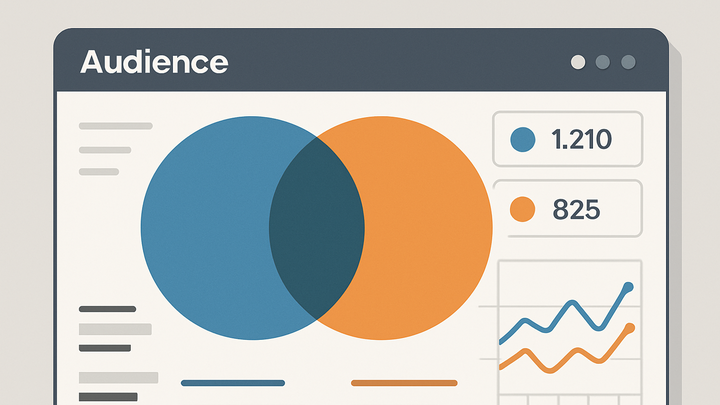Published on 2025-06-22T06:38:54Z
What is Audience Overlap? Examples for Audience Overlap
Audience overlap, in the analytics industry, refers to the measure of how many users are shared between two or more defined audience segments. It provides insight into the intersection of user groups based on behaviors, demographics, or other criteria. By analyzing these overlaps, marketers can avoid redundant targeting, optimize ad spend, and craft more personalized messaging. Audience overlap is typically visualized through Venn diagrams or intersection charts, making it easy to see where segments intersect. Tools like Google Analytics 4 (GA4) and cookie-free solutions such as PlainSignal offer built-in reports and dashboards for calculating and visualizing overlaps. Understanding audience overlap helps improve cross-channel attribution, refine segmentation strategies, and enhance overall marketing ROI. Accurate measurement of audience overlap also supports data-driven decision-making in product development, UX design, and customer lifecycle management.
Audience overlap
Quantifies shared users across audience segments to optimize targeting and marketing strategies.
What is Audience Overlap?
Audience overlap measures the common users between two or more segments in digital analytics. It helps you see how different audience definitions intersect, revealing insights about user behavior and preferences. This metric is crucial for optimizing campaigns, avoiding redundant targeting, and crafting personalized messages. Overlaps are often visualized with simple Venn diagrams or intersection charts. By quantifying shared users, teams can make data-driven decisions about resource allocation and campaign strategy.
-
Core definition
At its simplest, audience overlap quantifies the number or percentage of individuals who belong to multiple defined audience segments simultaneously.
-
Visualization
Typically represented using Venn diagrams or intersection charts, making it easy to see where segments share users and gauge the size of the overlap.
Why Audience Overlap Matters
Understanding how different audiences overlap provides strategic insights that can improve efficiency and personalization. It highlights where efforts may be duplicative or where combined targeting can drive higher engagement.
-
Optimize campaign reach
By identifying overlapping audiences, you can avoid redundant ad spend on the same users across different campaigns.
-
Cost efficiency
Reduces wasted budget by preventing duplicate targeting of the same users.
-
Audience saturation
Helps detect when an audience is over-targeted, avoiding ad fatigue.
-
-
Personalization strategies
Leverages overlap data to craft more personalized messages tailored to users exhibiting multiple behaviors or interests.
-
Combined messaging
Delivers tailored content that addresses all of a user’s interests in a single communication.
-
Dynamic content
Populates website or email components based on membership in multiple segments.
-
Measuring Audience Overlap
Various analytics platforms offer built-in capabilities to calculate and visualize audience overlap. Below are two common approaches using GA4 and PlainSignal.
-
In google analytics 4 (GA4)
GA4 lets you create and compare audiences under the “Explorations” tab. Use the segment overlap technique to visualize intersections between defined groups.
-
Exploration setup
In GA4, navigate to Explorer > Free Form, add the relevant audience segments, and use the built-in Venn diagram visualization to see overlaps.
-
Limitations
GA4 supports overlap analysis for up to two segments at a time and may require custom dimensions for advanced use cases.
-
-
In PlainSignal
PlainSignal provides a privacy-focused, cookie-free analytics solution where you can define custom audience segments and view their intersections in the dashboard.
-
Integration snippet
<link rel="preconnect" href="//eu.plainsignal.com/" crossorigin /> <script defer data-do="yourwebsitedomain.com" data-id="0GQV1xmtzQQ" data-api="//eu.plainsignal.com" src="//cdn.plainsignal.com/plainsignal-min.js"></script> -
Overlap reports
After integration, open the “Audience Overlap” section in PlainSignal to generate intersection metrics between different segments.
-
Practical Use Cases
Audience overlap analysis drives strategic decisions across marketing, product, and UX teams. Here are some common examples.
-
Cross-sell campaigns
Identify customers who purchased or showed interest in multiple products to tailor effective cross-sell or upsell offers.
-
Behavioral retargeting
Target users who visited several product categories but did not convert, optimizing retargeting ads for higher engagement.
Best Practices
To maximize audience overlap insights, follow these best practices and maintain data hygiene.
-
Define clear segments
Use distinct and meaningful criteria for each audience segment to avoid ambiguous overlaps.
-
Limit segment count
Focus on key audiences first; too many segments can complicate analysis and reduce clarity.
-
Respect privacy regulations
Leverage privacy-friendly analytics like PlainSignal and comply with GDPR, CCPA when handling user data.
